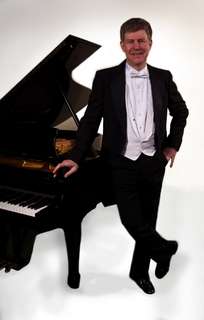|
Back
Hobson’s Joys New York
Di Capo Opera Theatre, 184 East 76th Street
08/24/2010 - & August 26, 31, September 2, October 25,28, November 8, 11, 15, 18, 2010
Frédéric Chopin: Impromptu No. 2 in F-sharp Major, Op 36 – Fantasie-Impromptu in C-sharp Minor, Op. 66, posthumous
Robert Schumann: Faschingsschwank aus Wien, Op. 26
Ludwig van Beethoven: Piano Sonata No. 29 in B-flat Major Op. 106, "Hammerklavier
Ignaz Moscheles: Impromptu
Ian Hobson (Pianist), David Dubal (Historical commentary)

I. Hobson (© Enid Farber)
The 24 hours between Taka Kigawa’s recital Monday evening and Ian Hobson’s recital last night was utterly disconcerting. More specifically, it was a quantum leap.
Mr. Kigawa’s recital consisted of Boulez, Xenakis, Webern and Pintscher, all of whom could be classified as non-lineal. The universe has no rules, reason is limited, logical sequences are never logical, space/time are impossible together, and art is self-contained.
Mr. Hobson, gave his first of 10 recitals devoted to lineal composers–specifically the bicentennial of Schumann and Chopin–for whom the world had rules and logic, space and time were complementary, instrumental art could generate human emotion.
Mr Kigawa’s audience needed the strictest cerebral attention for their satisfaction (besides the satisfaction of hearing Mr. Kigawa’s dexterity). Mr. Hobson was equally proficient, but his audience could be more passive, waiting for the great lines, the sweeps up the keyboard, the sensuousness of Chopin, the muscular joy of Schumann, the diversity of their colleagues.
But these thoughts should be private, since I was certainly the only member of both audiences, audiences which were as dissimilar as the music.
Initially, I was happy to go uptown last night. Mr. Hobson, the British pianist, conductor and writer now residing in the United States, is a master of many genres, though most reside in the 19th Century. His pianism is technically exciting, not idiosyncratic, always reliable, and often thrilling. So here, I felt, I could sit back and simply enjoy the show.
That show, though, was actually a lecture-demonstration. David Dubal, a famed broadcaster and noted authority on piano literature, gave longish (though never long-winded) talks between most of the works. They were anecdotal, scholarly, biographical and certainly entertaining. The audience loved it, as they should have. I simply wanted Mr. Hobson to play.
When he did, Mr. Hobson provided a most diverse recital. On the low end was a virtuosic piece by Ignaz Moscheles, who was one of the greatest virtuosos of the 19th Century, with concert appearances encompassing nearly eight decades, including duets with Chopin. His Impromptu must have wowed them during his triumphal appearances, probably as an encore. Under Mr. Hobson’s hands, it resembled a children’s nursery rhyme, albeit with firework scales and octave runs.
Obviously it was unfair to follow that directly with Chopin’s equally dexterous Fantasy-Impromptu for Chopin never ever wrote for the sake of showing digital dexterity. Mr. Hobson’s mastery of Chopin is more than comforting. Like the Moscheles, his Presto was unblurred, and now actually melodic. One always fears the middle will turn into the mawkish song to which it gave birth (“I’m always chasing raiiiin-bows…”), but Mr. Hobson knows too much for that.
The final work (before a Chopin encore), was Schumann’s Vienna Carnival Prank, and Mr. Hobson again showed reliability, joy and strength.
One work played here, before the intermission, actually could have been played by Mr. Kigawa at his recital. Beethoven’s Hammerklavier has three wonderful movements which always quoted. Mr. Hobson played the opening slowly, then built up to a grand climax. The slow movement sounded anything but interminable, for again he played in measured always expressive style.
The last movement, though, was genuinely individual. The fugue may be Everest (as Mr. Dubal noted), but the Himalayas have plenty of peaks surrounding Everest, and Mr. Hobson was ready to climb all of them. I doubt if this playing could be recorded successfully, for many of the details were lost in the flurry. But the aim of Mr. Hobson was obviously to climb the entire series of peaks, without stopping for any valleys.
The result was close to Mr. Kigawa’s music at Le Poisson Rouge, since it was irrational, illogical, yet possessing the power of the whole. It was as if Mr. Hobson was saying, “Nuance be damned! I’m Beethoven the Creator, not Beethoven the Plumber.”
Enough. Mr. Hobson will be giving nine more recitals (listed above). No two composers could have a more suitable 200th Birthday gift.
Harry Rolnick
|